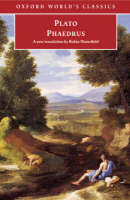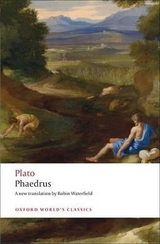
Phaedrus
Seiten
2003
|
New edition
Oxford University Press (Verlag)
978-0-19-280277-4 (ISBN)
Oxford University Press (Verlag)
978-0-19-280277-4 (ISBN)
- Titel erscheint in neuer Auflage
- Artikel merken
Zu diesem Artikel existiert eine Nachauflage
"Phaedrus" takes the form of a dialogue, with love as its ostensible subject. It closes by denigrating the value of the written word in any context, compared to the living teaching of a Socratic philosopher. Notes elucidate issues in the text that might puzzle the modern reader.
'Some of our greatest blessings come from madness Phaedrus is widely recognized as one of Plato's most profound and beautiful works. It takes the form of a dialogue between Socrates and Phaedrus and its ostensible subject is love, especially homoerotic love. Socrates reveals it to be a kind of divine madness that can allow our souls to grow wings and soar to their greatest heights. Then the conversation changes direction and turns to a discussion of rhetoric, which must be based on truth passionately sought, thus allying it to philosophy. The dialogue closes by denigrating the value of the written word in any context, compared to the living teaching of a Socratic philosopher. The shifts of topic and register have given rise to doubts about the unity of the dialogue, doubts which are addressed in the introduction to this volume. Full explanatory notes also elucidate issues throughout the dialogue that might puzzle a modern reader.
'Some of our greatest blessings come from madness Phaedrus is widely recognized as one of Plato's most profound and beautiful works. It takes the form of a dialogue between Socrates and Phaedrus and its ostensible subject is love, especially homoerotic love. Socrates reveals it to be a kind of divine madness that can allow our souls to grow wings and soar to their greatest heights. Then the conversation changes direction and turns to a discussion of rhetoric, which must be based on truth passionately sought, thus allying it to philosophy. The dialogue closes by denigrating the value of the written word in any context, compared to the living teaching of a Socratic philosopher. The shifts of topic and register have given rise to doubts about the unity of the dialogue, doubts which are addressed in the introduction to this volume. Full explanatory notes also elucidate issues throughout the dialogue that might puzzle a modern reader.
| Erscheint lt. Verlag | 1.2.2003 |
|---|---|
| Co-Autor | Robin Waterfield |
| Verlagsort | Oxford |
| Sprache | englisch |
| Themenwelt | Geisteswissenschaften ► Philosophie ► Philosophie Altertum / Antike |
| ISBN-10 | 0-19-280277-1 / 0192802771 |
| ISBN-13 | 978-0-19-280277-4 / 9780192802774 |
| Zustand | Neuware |
| Haben Sie eine Frage zum Produkt? |
Mehr entdecken
aus dem Bereich
aus dem Bereich
mit Sokrates, Seneca, Platon & Co. im Gespräch
Buch | Hardcover (2023)
FinanzBuch Verlag
18,00 €



